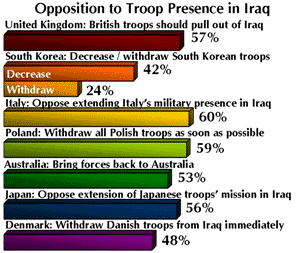Michael: Al Qaida Changes Gears
It seems a new, and fairly confusing, front in the terrorist campaign over Iraq has begun. The bombings of tourist hotels in Amman Jordan seem out of step with the goal of Al Qaida to use terrorist attacks to isolate America from its military coalition ‘partners’. The target even prompted many to wonder if Al Qaida in Iraq was not actually behind the attack, but was instead orchestrated by Sunni Baathists. The capture of one of the failed terrorists makes such an attribution much less likely. This attack highlights the highly decentralized nature of Al Qaida today.We’ve already seen Al Qaida cell strikes in Spain and England, aimed to prompting withdrawal of those nations from the coalition. It worked against Spain, but not yet against England. Concerns about the goals and handling of the war, as well as about possible terrorist attacks at home have caused several coalition partners to pull their troops (Ukraine, Portugal, Netherlands, Bulgaria, and others).
One would expect the next attacks to fall either on England again, or on the most mediagenic, influential, or internally unstable coalition members with troops in Iraq. Candidates would include Australia, Poland, South Korea, Japan or Georgia. But instead 5 suicide bombers struck in Jordan. It appears these bombers really did come from Al Zarqawi’s organization, and were not just working under cover of ‘Al Qaida in Iraq’. So why would Al Qaida want to strike at Jordan?
Jordan’s Hashemite Sunni king has been very accommodating of Washington’s goals and has even established a full embassy in Baghdad, granting recognition to the provisional government, something no other Arab League member has done. In the eyes of Al Qaida, such betrayals may have erased what natural sympathies there might have been, prompting this attack as a stern message to cease embracing the U.S. and its goals in the region.
 No doubt we will continue to see terrorist attacks on the civilian populations of coalition partners in the future. Based on the public opinion trends among key coalition partners, we can expect Al Qaida cells, if they if fact exist in those coalition partner countries, to strike where public opinion about the war is least favorable. My guess is that either Poland or Australia is next up. Poland offers the advantage of serving as a demonstration to America's numerous, "New Europe," Eastern European allies that they, too, are vulnerable. However, the very small foreign Muslim population in Poland (about 25K) is a fairly small population to recruit from for resident cells. Australia is, I think, a more likely target. Their English-speaking press will catapult awareness of the attack in England and America much more effectively, and they have a much larger Muslim population (over 250K), many of whom are recent immigrants, giving Al Qaida a much more fertile ground for recruitment.
No doubt we will continue to see terrorist attacks on the civilian populations of coalition partners in the future. Based on the public opinion trends among key coalition partners, we can expect Al Qaida cells, if they if fact exist in those coalition partner countries, to strike where public opinion about the war is least favorable. My guess is that either Poland or Australia is next up. Poland offers the advantage of serving as a demonstration to America's numerous, "New Europe," Eastern European allies that they, too, are vulnerable. However, the very small foreign Muslim population in Poland (about 25K) is a fairly small population to recruit from for resident cells. Australia is, I think, a more likely target. Their English-speaking press will catapult awareness of the attack in England and America much more effectively, and they have a much larger Muslim population (over 250K), many of whom are recent immigrants, giving Al Qaida a much more fertile ground for recruitment. The attacks in Jordan clearly demonstrate that Al Qaida is willing to take the immediate political heat to discipline Middle Eastern governments, as well as coalition 'partners'. Many have predicted the Iraq war would have the effect of spreading terrorism throughout the greater Middle East and potentially destabilizing allied and moderate Middle Eastern regimes. That prediction, while not fully realized, seems now more likely to come to pass.



0 Comments:
Post a Comment
<< Home